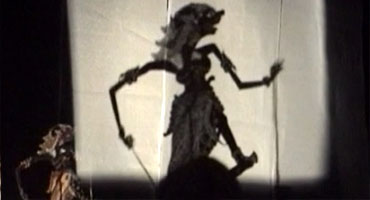
 I agree
I agree
.
Lara Tanpa Liru [Sick Beyond Repair] (2006)
Dalang: Nanang Hape
How to cite: Nanang Hape ([2006] 2016), Lara Tanpa Liru [Sick Beyond Repair], translation and notes by Miguel Escobar Varela, Indraswari Kusumaningtyas and Yosephin Novi Marginingrum. Singapore: Contemporary Wayang Archive. Retrieved from http://cwa-web.org/en/LaraTanpaLiru.
Summary
The parallel stories of two mothers, Arimbi and Kunti, are told through songs and narrative fragments. Arimbi, a giant princess who married Bima, talks about her son Gatotkaca. Kunti, the mother of the Pandawa, talks about her eldest son, Karna, who was born out of wedlock and ends up fighting for the Korawa faction.
Story: Mahabharata
Music: Gamelan, Distinctive Fusion
Space: Modified Screen, Black Box
Performers: Dalang as Actor, Actors
Puppets: Wayang Kulit Puppets
Language: Javanese
Recording details
Notes: Performed at the 2006 Bengawan Solo Festival, which took place 1 - 7 September 2006
Produced by: Kayon Miring
Recording place: Taman Arena, Surakarta
Addional credits
Composer: Joko Porong
Lighting designer: Sugeng Yeah
Actor: Gendoet Counter
Singer: Cahwati
Musicians: Kiki Dunung, Joko Menggung, Githunx, Dwi Gepenx, Bambang mBendhol, Pelog, Sugeng Klanthe, Hasto Ngrampal, Turah, Jacky Mubarok, Sugeng Nom
View the metadata record for this resource.
Translation and notes by Miguel Escobar Varela (MEV), Indraswari Kusumaningtyas (IK) and Yosephin Novi Marginingrum (YNM).
1. This is the voice of Karna. Karna meets with Gatotkaca before meeting Arjuna IK.
2. Baratayuha jayabinangun [The big war, bearer of glory] is the complete name of the war IK.
3. This voice is from a person not seen on stage YNM.
4. Gendoet Counter [Fat Counter] is the stage name of the performer YNM.
5. Here, Karna is talking about meeting in the battlefield. Karna tells Gatotkaca that they have no real reason to fight, they have never been enemies. In contrast, Arjuna and Karna have a history of animosity (this is narrated in Mirwan Suwarso's Jabang Tetuka) YNM and MEV.
6. The song is taken from the Dhandhanggula section 5 in the Serat Tripama by Mangkunagara IV (1809-1881). The complete song is as follows: Yogya malih kinarya palupi, Suryaputra narpati Ngawangga, lan Pandhawa tur kadangé, lèn yayah tunggil ibu, suwita mring Sri Kurupati, anèng nagri Ngastina, kinarya gul-agul, manggala golanganing prang, Bratayudha ingaděgkěn sénapati, ngalaga ing Korawa [There is something else which must be understood, Suryaputra the king of Awangga is still the brother of the Pandawa, of different fathers but same mother, he became a servant of Sri Kurupati, in the kingdom of Astina, he was given a nobility title and made a general in the Baratayuda war, to fight for the Korawa faction] YNM.
7. Prabu ing Dwarawati [King of Dwarawati] is Kresna. In the Baratayuda, Kresna supported the Pandawa with his advice and the Korawa with his army, as he was related by blood ties to both MEV.
8. Bĕrgandang [to stand up straight with the legs far apart] represents strength and the willingness to face a challenge MEV.
9. Métani [to search for lice in someone's hair] YNM.
10. Golong round is used to imply unison YNM.
11. Bratasena is another name for Bima IK.
12. Mas Séna is a reference to Bratasena or Arya Sena, another name for Werkudara or Bima MEV.
13. Prabu Trembaka, also known as Arimbaka, is the giant king in the Pringgadani kingdom. He died in a war against Astina and was succeeded in the throne by his eldest son, Arimba YNM.
14. The dalang himself is known for his long curly hair MEV.
15. Here the dalang is responding to a comment from the audience, who said that he prefers a girl who does not speak too much IK.
16. Someone reminds the dalang that this interlude is taking too long IK.
17. Panědah [Index finger] YNM. Kuku Pancanaka [a sharp and long nail in Bima's right thumb which he uses as a weapon] IK.
18. Patibrata [to be faithful to one's spouse] YNM.
19. Joko Porong is one of the musicians in this performance YNM.
20. Arimba (in Javanese) or Hidimba (in Sanskrit) is the King of Pringgadani that succeeded Arimbaka or Trembaka in the throne. Arimba will be later killed by Bima YNM.
21. "Maju Tak Gentar" is a song written by C. Simanjuntak during Indonesia's struggle for independence in 1945 IK.
22. This performance was recorded in Solo, in central Java. The neighboring province is Eastern Java MEV.
23. There is a famous rivalry between the cities of Yogyakarta and Solo. The styles of the music and the puppets are different but still closely related MEV.
24. LM is explained as Lé Maling [obtained by stealing] IK.
25. This is Kunti speaking. Arimbi (in Javanese) or Hidimbi (in Sanskrit) is the daughter of Arimbaka or Trembaka. After the death of her brother Arimba, Arimbi was crowned as the ruler of Pringgadani. Arimbi married Bima and had a son with him, Gatotkaca. Arimbi has the magical power to transform herself from a giant into a beautiful woman. She used this power the first time she met Bima YNM.
26. Kunti is explaining her own life story to Arimbi. She followed her own desires and became pregnant out of wedlock with the offspring of the God of the Sun. This child was named Karna YNM.
27. Kunti was given the Pepanggil amulet by Resi Druwasa. This amulet had the power of making anyone fall in love with her. She used this amulet on Batara Surya, the God of the Sun, which led to her pregnancy YNM.
28. The dalang is imitating the voice of a bus driver calling out the names of the destinations IK.
29. The one speaking is Duryudana IK.
30. Duryudana introduces Karna as a brother of the Kurawa IK.
31. The Kurawa support Karna, but request him to pay his dues by fighting for them during the Bharatayuda war IK.
The honorifics in the original languages were retained in the subtitles. In Javanese and Indonesian, speakers address their interlocutors with over 40 different honorifics which denote differences in their relative status and level of intimacy.
ID = Indonesian
JW = Javanese
Adik. ID. Younger brother/sister. It is used for addressing younger people, not necessarily one's relatives.
Adinda. ID. Younger sister. More intimate than adik.
Babé. ID/Betawi. Familiar form of father, commonly used in Jakarta.
Bé. ID/Betawi. Short form of Babé, father. Jakartan slang.
Bang. ID. Older brother, short form of abang. If used with non-relatives, it is has the connotation of a slang, and is somewhat equivalent to “man” in English.
Bĕndara. JW. Master.
Bibi. JW/ID. Aunt. A way of addressing/referring to older women.
Bos. ID/JW. An adaptation of the English "boss". Used either to refer to one's superior or to a friend in a joking context, for example, when a person orders others around without realizing he/she is doing so.
Bu. ID/JW. Short form of ibu, mother.
Bung. ID. Similar to bang, but slightly less formal. It might mean "comrade". The political leaders of the independence war are often referred to with this term, for example Sukarno is often referred to as
Bung Karno.
Dara. JW. Short form of bĕndara, master.
Dèn. JW. Sir, master, used to address royalty. Short form of radèn.
Dhé. JW. Short form of pakdhé, uncle.
Dhik. JW. Short form of adhik. Younger brother/sister. It is used for addressing younger people, not necessarily one's relatives.
Éyang. JW. Grandfather.
Dimas. JW. Younger brother.
Gusti. JW. Lord. Used to address superiors and Gods.
Ibu. JW/ID. Mother. Used generically to address women who are older than the speaker.
Kakang. JW. Older brother.
Kakang mbok. JW. Older sister.
Kanda. ID. Older brother. Formal.
Kang. JW. Older brother. Informal.
Kangmas. JW. Older brother.
Kaki. JW. Uncle
Kang. JW. Older brother, used generically for men older than the speaker. It is a shortened version of kangmas).
Kakak. JW/ID. Older brother/sister, used generically for people who are older than the speaker.
Lé. JW. Son, short version of tholé.
Lik. JW. Often used between friends as a slang term of address. Uncle, "little father." Short form of {paklik}.
Ma. JW. Same as pak, short form of rama.
Mbak. JW/ID. Older sister. Used generically for women who are slightly older than the speaker.
Mamang. ID. Uncle.
Mang. ID. Uncle, short form of mamang.
Mas. ID. Older brother, used generically for men who are older than the speaker. Although it is also a shortened version of the Javanese kangmas people prefer to use mas in Indonesian and kang in Javanese.
Mas bro. ID. Slang used among male friends. In a way, it is a reduplication.
Mbah. JW/ID Grandfather, grandmother. It is used generically to address people who are much older than the speaker. Short form of simbah.
Mbok. JW. Mother, short form of simbok. Used generically for women who are older than the speaker.
Mbokdhé. JW. Aunt. Literally, "big mother".
Mbul. JW. Informal term of address between close male friends.
Ndara. JW. Master.
Nduk. JW. Daughter, short form of gĕndhuk.
Nggèr. JW. Son, short form of anggèr Used generically for people who are younger than the speaker, with whom the speaker is on intimate terms.
Nimas. JW. Younger sister.
Nok. JW. West Javanese term for daughter, short form of dhénok.
Nona. ID. Miss, unmarried woman.
Paduka. ID. Your Excellency.
Pak. JW/ID. Father, used generically for men who are older than the speaker.
Pakdhé. JW. Uncle. Used to refer to a man who is older than one's father.
Paman. ID. Uncle. Used to refer to a man who is older than one's father.
Pangéran. JW/ID. Prince.
Prabu. JW. King.
Radén. JW. Master, used for royalty.
Rama. JW. Father. It can also be used to designate catholic priests when one is speaking in Indonesian.
Simbah. JW/ID Grandfather, grandmother. It is used generically to address people who are much older than the speaker.
Sinuwun. JW. Very formal way to address a man, reserved for sultans, kings and Gods.
Siwa. JW. Term for addressing older people.
Siwak. JW. Same as Siwa. Term for addressing older people.
Tholé. JW. Son
Tuan. ID. In colonial contexts, this is the way foreigners are addressed but it can also mean sir.
Wa Nĕrpati. JW. Uncle king, equivalent to the Indonesian paman raja.
Wa. JW. For addressing older people, short form of siwa.
Yayi. JW. Younger brother/sister.
Yunda. JW. Older sister.
See the Translation conventions.
Share:
in the translations or data.
